- Home
- G. K. Chesterton
The Man Who Knew Too Much Page 2
The Man Who Knew Too Much Read online
Page 2
II. THE VANISHING PRINCE
This tale begins among a tangle of tales round a name that is atonce recent and legendary. The name is that of Michael O'Neill,popularly called Prince Michael, partly because he claimed descentfrom ancient Fenian princes, and partly because he was credited witha plan to make himself prince president of Ireland, as the lastNapoleon did of France. He was undoubtedly a gentleman of honorablepedigree and of many accomplishments, but two of his accomplishmentsemerged from all the rest. He had a talent for appearing when he wasnot wanted and a talent for disappearing when he was wanted,especially when he was wanted by the police. It may be added thathis disappearances were more dangerous than his appearances. In thelatter he seldom went beyond the sensational--pasting up seditiousplacards, tearing down official placards, making flamboyantspeeches, or unfurling forbidden flags. But in order to effect theformer he would sometimes fight for his freedom with startlingenergy, from which men were sometimes lucky to escape with a brokenhead instead of a broken neck. His most famous feats of escape,however, were due to dexterity and not to violence. On a cloudlesssummer morning he had come down a country road white with dust, and,pausing outside a farmhouse, had told the farmer's daughter, withelegant indifference, that the local police were in pursuit of him.The girl's name was Bridget Royce, a somber and even sullen type ofbeauty, and she looked at him darkly, as if in doubt, and said, "Doyou want me to hide you?" Upon which he only laughed, leaped lightlyover the stone wall, and strode toward the farm, merely throwingover his shoulder the remark, "Thank you, I have generally beenquite capable of hiding myself." In which proceeding he acted with atragic ignorance of the nature of women; and there fell on his pathin that sunshine a shadow of doom.
While he disappeared through the farmhouse the girl remained for afew moments looking up the road, and two perspiring policemen cameplowing up to the door where she stood. Though still angry, she wasstill silent, and a quarter of an hour later the officers hadsearched the house and were already inspecting the kitchen gardenand cornfield behind it. In the ugly reaction of her mood she mighthave been tempted even to point out the fugitive, but for a smalldifficulty that she had no more notion than the policemen had ofwhere he could possibly have gone. The kitchen garden was inclosedby a very low wall, and the cornfield beyond lay aslant like asquare patch on a great green hill on which he could still have beenseen even as a dot in the distance. Everything stood solid in itsfamiliar place; the apple tree was too small to support or hide aclimber; the only shed stood open and obviously empty; there was nosound save the droning of summer flies and the occasional flutter ofa bird unfamiliar enough to be surprised by the scarecrow in thefield; there was scarcely a shadow save a few blue lines that fellfrom the thin tree; every detail was picked out by the brilliant daylight as if in a microscope. The girl described the scene later,with all the passionate realism of her race, and, whether or no thepolicemen had a similar eye for the picturesque, they had at leastan eye for the facts of the case, and were compelled to give up thechase and retire from the scene. Bridget Royce remained as if in atrance, staring at the sunlit garden in which a man had justvanished like a fairy. She was still in a sinister mood, and themiracle took in her mind a character of unfriendliness and fear, asif the fairy were decidedly a bad fairy. The sun upon the glitteringgarden depressed her more than the darkness, but she continued tostare at it. Then the world itself went half-witted and shescreamed. The scarecrow moved in the sun light. It had stood withits back to her in a battered old black hat and a tattered garment,and with all its tatters flying, it strode away across the hill.
She did not analyze the audacious trick by which the man had turnedto his advantage the subtle effects of the expected and the obvious;she was still under the cloud of more individual complexities, andshe noticed most of all that the vanishing scarecrow did not eventurn to look at the farm. And the fates that were running so adverseto his fantastic career of freedom ruled that his next adventure,though it had the same success in another quarter, should increasethe danger in this quarter. Among the many similar adventuresrelated of him in this manner it is also said that some daysafterward another girl, named Mary Cregan, found him concealed onthe farm where she worked; and if the story is true, she must alsohave had the shock of an uncanny experience, for when she was busyat some lonely task in the yard she heard a voice speaking out ofthe well, and found that the eccentric had managed to drop himselfinto the bucket which was some little way below, the well onlypartly full of water. In this case, however, he had to appeal to thewoman to wind up the rope. And men say it was when this news wastold to the other woman that her soul walked over the border line oftreason.
Such, at least, were the stories told of him in the countryside, andthere were many more--as that he had stood insolently in a splendidgreen dressing gown on the steps of a great hotel, and then led thepolice a chase through a long suite of grand apartments, and finallythrough his own bedroom on to a balcony that overhung the river. Themoment the pursuers stepped on to the balcony it broke under them,and they dropped pell-mell into the eddying waters, while Michael,who had thrown off his gown and dived, was able to swim away. It wassaid that he had carefully cut away the props so that they would notsupport anything so heavy as a policeman. But here again he wasimmediately fortunate, yet ultimately unfortunate, for it is saidthat one of the men was drowned, leaving a family feud which made alittle rift in his popularity. These stories can now be told in somedetail, not because they are the most marvelous of his manyadventures, but because these alone were not covered with silence bythe loyalty of the peasantry. These alone found their way intoofficial reports, and it is these which three of the chief officialsof the country were reading and discussing when the more remarkablepart of this story begins.
Night was far advanced and the lights shone in the cottage thatserved for a temporary police station near the coast. On one side ofit were the last houses of the straggling village, and on the othernothing but a waste moorland stretching away toward the sea, theline of which was broken by no landmark except a solitary tower ofthe prehistoric pattern still found in Ireland, standing up asslender as a column, but pointed like a pyramid. At a wooden tablein front of the window, which normally looked out on this landscape,sat two men in plain clothes, but with something of a militarybearing, for indeed they were the two chiefs of the detectiveservice of that district. The senior of the two, both in age andrank, was a sturdy man with a short white beard, and frosty eyebrowsfixed in a frown which suggested rather worry than severity.
His name was Morton, and he was a Liverpool man long pickled in theIrish quarrels, and doing his duty among them in a sour fashion notaltogether unsympathetic. He had spoken a few sentences to hiscompanion, Nolan, a tall, dark man with a cadaverous equine Irishface, when he seemed to remember something and touched a bell whichrang in another room. The subordinate he had summoned immediatelyappeared with a sheaf of papers in his hand.
"Sit down, Wilson," he said. "Those are the depositions, Isuppose."
"Yes," replied the third officer. "I think I've got all there is tobe got out of them, so I sent the people away."
"Did Mary Cregan give evidence?" asked Morton, with a frown thatlooked a little heavier than usual.
"No, but her master did," answered the man called Wilson, who hadflat, red hair and a plain, pale face, not without sharpness. "Ithink he's hanging round the girl himself and is out against arival. There's always some reason of that sort when we are told thetruth about anything. And you bet the other girl told right enough."
"Well, let's hope they'll be some sort of use," remarked Nolan, in asomewhat hopeless manner, gazing out into the darkness.
"Anything is to the good," said Morton, "that lets us know anythingabout him."
"Do we know anything about him?" asked the melancholy Irishman.
"We know one thing about him," said Wilson, "and it's the one thingthat nobody ever knew before. We know where he is."
"Are you sure?" inquired Morton,
looking at him sharply.
"Quite sure," replied his assistant. "At this very minute he is inthat tower over there by the shore. If you go near enough you'll seethe candle burning in the window."
As he spoke the noise of a horn sounded on the road outside, and amoment after they heard the throbbing of a motor car brought to astandstill before the door. Morton instantly sprang to his feet.
"Thank the Lord that's the car from Dublin," he said. "I can't doanything without special authority, not if he were sitting on thetop of the tower and putting out his tongue at us. But the chief cando what he thinks best."
He hurried out to the entrance and was soon exchanging greetingswith a big handsome man in a fur coat, who brought into the dingylittle station the indescribable glow of the great cities and theluxuries of the great world.
For this was Sir Walter Carey, an official of such eminence inDublin Castle that nothing short of the case of Prince Michael wouldhave brought him on such a journey in the middle of the night. Butthe case of Prince Michael, as it happened, was complicated bylegalism as well as lawlessness. On the last occasion he had escapedby a forensic quibble and not, as usual, by a private escapade; andit was a question whether at the moment he was amenable to the lawor not. It might be necessary to stretch a point, but a man like SirWalter could probably stretch it as far as he liked.
Whether he intended to do so was a question to be considered.Despite the almost aggressive touch of luxury in the fur coat, itsoon became apparent that Sir Walter's large leonine head was foruse as well as ornament, and he considered the matter soberly andsanely enough. Five chairs were set round the plain deal table, forwho should Sir Walter bring with him but his young relative andsecretary, Horne Fisher. Sir Walter listened with grave attention,and his secretary with polite boredom, to the string of episodes bywhich the police had traced the flying rebel from the steps of thehotel to the solitary tower beside the sea. There at least he wascornered between the moors and the breakers; and the scout sent byWilson reported him as writing under a solitary candle, perhapscomposing another of his tremendous proclamations. Indeed, it wouldhave been typical of him to choose it as the place in which finallyto turn to bay. He had some remote claim on it, as on a familycastle; and those who knew him thought him capable of imitating theprimitive Irish chieftains who fell fighting against the sea.
"I saw some queer-looking people leaving as I came in," said SirWalter Carey. "I suppose they were your witnesses. But why do theyturn up here at this time of night?"
Morton smiled grimly. "They come here by night because they wouldbe dead men if they came here by day. They are criminals committinga crime that is more horrible here than theft or murder."
"What crime do you mean?" asked the other, with some curiosity.
"They are helping the law," said Morton.
There was a silence, and Sir Walter considered the papers before himwith an abstracted eye. At last he spoke.
"Quite so; but look here, if the local feeling is as lively as thatthere are a good many points to consider. I believe the new Act willenable me to collar him now if I think it best. But is it best? Aserious rising would do us no good in Parliament, and the governmenthas enemies in England as well as Ireland. It won't do if I havedone what looks a little like sharp practice, and then only raised arevolution."
"It's all the other way," said the man called Wilson, ratherquickly. "There won't be half so much of a revolution if you arresthim as there will if you leave him loose for three days longer. But,anyhow, there can't be anything nowadays that the proper policecan't manage."
"Mr. Wilson is a Londoner," said the Irish detective, with a smile.
"Yes, I'm a cockney, all right," replied Wilson, "and I think I'mall the better for that. Especially at this job, oddly enough."
Sir Walter seemed slightly amused at the pertinacity of the thirdofficer, and perhaps even more amused at the slight accent withwhich he spoke, which rendered rather needless his boast about hisorigin.
"Do you mean to say," he asked, "that you know more about thebusiness here because you have come from London?"
"Sounds funny, I know, but I do believe it," answered Wilson. "Ibelieve these affairs want fresh methods. But most of all I believethey want a fresh eye."
The superior officers laughed, and the redhaired man went on with aslight touch of temper:
"Well, look at the facts. See how the fellow got away every time,and you'll understand what I mean. Why was he able to stand in theplace of the scarecrow, hidden by nothing but an old hat? Because itwas a village policeman who knew the scarecrow was there, wasexpecting it, and therefore took no notice of it. Now I never expecta scarecrow. I've never seen one in the street, and I stare at onewhen I see it in the field. It's a new thing to me and worthnoticing. And it was just the same when he hid in the well. You areready to find a well in a place like that; you look for a well, andso you don't see it. I don't look for it, and therefore I do look atit."
"It is certainly an idea," said Sir Walter, smiling, "but what aboutthe balcony? Balconies are occasionally seen in London."
"But not rivers right under them, as if it was in Venice," repliedWilson.
"It is certainly a new idea," repeated Sir Walter, with somethinglike respect. He had all the love of the luxurious classes for newideas. But he also had a critical faculty, and was inclined tothink, after due reflection, that it was a true idea as well.
Growing dawn had already turned the window panes from black to graywhen Sir Walter got abruptly to his feet. The others rose also,taking this for a signal that the arrest was to be undertaken. Buttheir leader stood for a moment in deep thought, as if consciousthat he had come to a parting of the ways.
Suddenly the silence was pierced by a long, wailing cry from thedark moors outside. The silence that followed it seemed morestartling than the shriek itself, and it lasted until Nolan said,heavily:
"'Tis the banshee. Somebody is marked for the grave."
His long, large-featured face was as pale as a moon, and it was easyto remember that he was the only Irishman in the room.
"Well, I know that banshee," said Wilson, cheerfully, "ignorant asyou think I am of these things. I talked to that banshee myself anhour ago, and I sent that banshee up to the tower and told her tosing out like that if she could get a glimpse of our friend writinghis proclamation."
"Do you mean that girl Bridget Royce?" asked Morton, drawing hisfrosty brows together. "Has she turned king's evidence to thatextent?"
"Yes," answered Wilson. "I know very little of these local things,you tell me, but I reckon an angry woman is much the same in allcountries."
Nolan, however, seemed still moody and unlike himself. "It's an uglynoise and an ugly business altogether," he said. "If it's really theend of Prince Michael it may well be the end of other things aswell. When the spirit is on him he would escape by a ladder of deadmen, and wade through that sea if it were made of blood."
"Is that the real reason of your pious alarms?" asked Wilson, with aslight sneer.
The Irishman's pale face blackened with a new passion.
"I have faced as many murderers in County Clare as you ever foughtwith in Clapham Junction, Mr. Cockney," he said.
"Hush, please," said Morton, sharply. "Wilson, you have no kind ofright to imply doubt of your superior's conduct. I hope you willprove yourself as courageous and trustworthy as he has always been."
The pale face of the red-haired man seemed a shade paler, but he wassilent and composed, and Sir Walter went up to Nolan with markedcourtesy, saying, "Shall we go outside now, and get this businessdone?"
Dawn had lifted, leaving a wide chasm of white between a great graycloud and the great gray moorland, beyond which the tower wasoutlined against the daybreak and the sea.
Something in its plain and primitive shape vaguely suggested thedawn in the first days of the earth, in some prehistoric time wheneven the colors were hardly created, when there was only blankdaylight between cloud and clay. These dead
hues were relieved onlyby one spot of gold--the spark of the candle alight in the windowof the lonely tower, and burning on into the broadening daylight. Asthe group of detectives, followed by a cordon of policemen, spreadout into a crescent to cut off all escape, the light in the towerflashed as if it were moved for a moment, and then went out. Theyknew the man inside had realized the daylight and blown out hiscandle.
"There are other windows, aren't there?" asked Morton, "and a door,of course, somewhere round the corner? Only a round tower has nocorners."
"Another example of my small suggestion," observed Wilson, quietly."That queer tower was the first thing I saw when I came to theseparts; and I can tell you a little more about it--or, at any rate,the outside of it. There are four windows altogether, one a littleway from this one, but just out of sight. Those are both on theground floor, and so is the third on the other side, making a sortof triangle. But the fourth is just above the third, and I supposeit looks on an upper floor."
"It's only a sort of loft, reached by a ladder, said Nolan. "I'veplayed in the place when I was a child. It's no more than an emptyshell." And his sad face grew sadder, thinking perhaps of thetragedy of his country and the part that he played in it.
"The man must have got a table and chair, at any rate," said Wilson,"but no doubt he could have got those from some cottage. If I mightmake a suggestion, sir, I think we ought to approach all the fiveentrances at once, so to speak. One of us should go to the door andone to each window; Macbride here has a ladder for the upperwindow."
Mr. Horne Fisher languidly turned to his distinguished relative andspoke for the first time.
"I am rather a convert to the cockney school of psychology," he saidin an almost inaudible voice.
The others seemed to feel the same influence in different ways, forthe group began to break up in the manner indicated. Morton movedtoward the window immediately in front of them, where the hiddenoutlaw had just snuffed the candle; Nolan, a little farther westwardto the next window; while Wilson, followed by Macbride with theladder, went round to the two windows at the back. Sir Walter Careyhimself, followed by his secretary, began to walk round toward theonly door, to demand admittance in a more regular fashion.
"He will be armed, of course," remarked Sir Walter, casually.
"By all accounts," replied Horne Fisher, "he can do more with acandlestick than most men with a pistol. But he is pretty sure tohave the pistol, too."
Even as he spoke the question was answered with a tongue of thunder.Morton had just placed himself in front of the nearest window, hisbroad shoulders blocking the aperture. For an instant it was litfrom within as with red fire, followed by a thundering throng ofechoes. The square shoulders seemed to alter in shape, and thesturdy figure collapsed among the tall, rank grasses at the foot ofthe tower. A puff of smoke floated from the window like a littlecloud. The two men behind rushed to the spot and raised him, but hewas dead.
Sir Walter straightened himself and called out something that waslost in another noise of firing; it was possible that the policewere already avenging their comrade from the other side. Fisher hadalready raced round to the next window, and a new cry ofastonishment from him brought his patron to the same spot. Nolan,the Irish policeman, had also fallen, sprawling all his great lengthin the grass, and it was red with his blood. He was still alive whenthey reached him, but there was death on his face, and he was onlyable to make a final gesture telling them that all was over; and,with a broken word and a heroic effort, motioning them on to wherehis other comrades were besieging the back of the tower. Stunned bythese rapid and repeated shocks, the two men could only vaguely obeythe gesture, and, finding their way to the other windows at theback, they discovered a scene equally startling, if less final andtragic. The other two officers were not dead or mortally wounded,but Macbride lay with a broken leg and his ladder on top of him,evidently thrown down from the top window of the tower; while Wilsonlay on his face, quite still as if stunned, with his red head amongthe gray and silver of the sea holly. In him, however, the impotencewas but momentary, for he began to move and rise as the others cameround the tower.
"My God! it's like an explosion!" cried Sir Walter; and indeed itwas the only word for this unearthly energy, by which one man hadbeen able to deal death or destruction on three sides of the samesmall triangle at the same instant.
Wilson had already scrambled to his feet and with splendid energyflew again at the window, revolver in hand. He fired twice into theopening and then disappeared in his own smoke; but the thud of hisfeet and the shock of a falling chair told them that the intrepidLondoner had managed at last to leap into the room. Then followed acurious silence; and Sir Walter, walking to the window through thethinning smoke, looked into the hollow shell of the ancient tower.Except for Wilson, staring around him, there was nobody there.
The inside of the tower was a single empty room, with nothing but aplain wooden chair and a table on which were pens, ink and paper,and the candlestick. Halfway up the high wall there was a rudetimber platform under the upper window, a small loft which was morelike a large shelf. It was reached only by a ladder, and it seemedto be as bare as the bare walls. Wilson completed his survey of theplace and then went and stared at the things on the table. Then hesilently pointed with his lean forefinger at the open page of thelarge notebook. The writer had suddenly stopped writing, even in themiddle of a word.
"I said it was like an explosion," said Sir Walter Carey at last."And really the man himself seems to have suddenly exploded. But hehas blown himself up somehow without touching the tower. He's burstmore like a bubble than a bomb."
"He has touched more valuable things than the tower," said Wilson,gloomily.
There was a long silence, and then Sir Walter said, seriously:"Well, Mr. Wilson, I am not a detective, and these unhappyhappenings have left you in charge of that branch of the business.We all lament the cause of this, but I should like to say that Imyself have the strongest confidence in your capacity for carryingon the work. What do you think we should do next?"
Wilson seemed to rouse himself from his depression and acknowledgedthe speaker's words with a warmer civility than he had hithertoshown to anybody. He called in a few of the police to assist inrouting out the interior, leaving the rest to spread themselves in asearch party outside.
"I think," he said, "the first thing is to make quite sure about theinside of this place, as it was hardly physically possible for himto have got outside. I suppose poor Nolan would have brought in hisbanshee and said it was supernaturally possible. But I've got no usefor disembodied spirits when I'm dealing with facts. And the factsbefore me are an empty tower with a ladder, a chair, and a table."
"The spiritualists," said Sir Walter, with a smile, "would say thatspirits could find a great deal of use for a table."
"I dare say they could if the spirits were on the table--in abottle," replied Wilson, with a curl of his pale lip. "The peopleround here, when they're all sodden up with Irish whisky, maybelieve in such things. I think they want a little education in thiscountry."
Horne Fisher's heavy eyelids fluttered in a faint attempt to rise,as if he were tempted to a lazy protest against the contemptuoustone of the investigator.
"The Irish believe far too much in spirits to believe inspiritualism," he murmured. "They know too much about 'em. If youwant a simple and childlike faith in any spirit that comes along youcan get it in your favorite London."
"I don't want to get it anywhere," said Wilson, shortly. "I say I'mdealing with much simpler things than your simple faith, with atable and a chair and a ladder. Now what I want to say about them atthe start is this. They are all three made roughly enough of plainwood. But the table and the chair are fairly new and comparativelyclean. The ladder is covered with dust and there is a cobweb underthe top rung of it. That means that he borrowed the first two quiterecently from some cottage, as we supposed, but the ladder has beena long time in this rotten old dustbin. Probably it was part of theoriginal furniture, an heirloo
m in this magnificent palace of theIrish kings."
Again Fisher looked at him under his eyelids, but seemed too sleepyto speak, and Wilson went on with his argument.
"Now it's quite clear that something very odd has just happened inthis place. The chances are ten to one, it seems to me, that it hadsomething specially to do with this place. Probably he came herebecause he could do it only here; it doesn't seem very invitingotherwise. But the man knew it of old; they say it belonged to hisfamily, so that altogether, I think, everything points to somethingin the construction of the tower itself."
"Your reasoning seems to me excellent," said Sir Walter, who waslistening attentively. "But what could it be?"
"You see now what I mean about the ladder," went on the detective;"it's the only old piece of furniture here and the first thing thatcaught that cockney eye of mine. But there is something else. Thatloft up there is a sort of lumber room without any lumber. So far asI can see, it's as empty as everything else; and, as things are, Idon't see the use of the ladder leading to it. It seems to me, as Ican't find anything unusual down here, that it might pay us to lookup there."
He got briskly off the table on which he was sitting (for the onlychair was allotted to Sir Walter) and ran rapidly up the ladder tothe platform above. He was soon followed by the others, Mr. Fishergoing last, however, with an appearance of considerable nonchalance.
At this stage, however, they were destined to disappointment; Wilsonnosed in every corner like a terrier and examined the roof almost inthe posture of a fly, but half an hour afterward they had to confessthat they were still without a clew. Sir Walter's private secretaryseemed more and more threatened with inappropriate slumber, and,having been the last to climb up the ladder, seemed now to lack theenergy even to climb down again.
"Come along, Fisher," called out Sir Walter from below, when theothers had regained the floor. "We must consider whether we'll pullthe whole place to pieces to see what it's made of."
"I'm coming in a minute," said the voice from the ledge above theirheads, a voice somewhat suggestive of an articulate yawn.
"What are you waiting for?" asked Sir Walter, impatiently. "Can yousee anything there?"
"Well, yes, in a way," replied the voice, vaguely. "In fact, I seeit quite plain now."
"What is it?" asked Wilson, sharply, from the table on which he satkicking his heels restlessly.
"Well, it's a man," said Horne Fisher.
Wilson bounded off the table as if he had been kicked off it. "Whatdo you mean?" he cried. "How can you possibly see a man?"
"I can see him through the window," replied the secretary, mildly."I see him coming across the moor. He's making a bee line across theopen country toward this tower. He evidently means to pay us avisit. And, considering who it seems to be, perhaps it would be morepolite if we were all at the door to receive him." And in aleisurely manner the secretary came down the ladder.
"Who it seems to be!" repeated Sir Walter in astonishment.
"Well, I think it's the man you call Prince Michael," observed Mr.Fisher, airily. "In fact, I'm sure it is. I've seen the policeportraits of him."
There was a dead silence, and Sir Walter's usually steady brainseemed to go round like a windmill.
"But, hang it all!" he said at last, "even supposing his ownexplosion could have thrown him half a mile away, without passingthrough any of the windows, and left him alive enough for a countrywalk--even then, why the devil should he walk in this direction?The murderer does not generally revisit the scene of his crime sorapidly as all that."
"He doesn't know yet that it is the scene of his crime," answeredHorne Fisher.
"What on earth do you mean? You credit him with rather singularabsence of mind."
"Well, the truth is, it isn't the scene of his crime," said Fisher,and went and looked out of the window.
There was another silence, and then Sir Walter said, quietly: "Whatsort of notion have you really got in your head, Fisher? Have youdeveloped a new theory about how this fellow escaped out of the ringround him?"
"He never escaped at all," answered the man at the window, withoutturning round. "He never escaped out of the ring because he wasnever inside the ring. He was not in this tower at all, at least notwhen we were surrounding it."
He turned and leaned back against the window, but, in spite of hisusual listless manner, they almost fancied that the face in shadowwas a little pale.
"I began to guess something of the sort when we were some way fromthe tower," he said. "Did you notice that sort of flash or flickerthe candle gave before it was extinguished? I was almost certain itwas only the last leap the flame gives when a candle burns itselfout. And then I came into this room and I saw that."
He pointed at the table and Sir Walter caught his breath with a sortof curse at his own blindness. For the candle in the candlestick hadobviously burned itself away to nothing and left him, mentally, atleast, very completely in the dark.
"Then there is a sort of mathematical question," went on Fisher,leaning back in his limp way and looking up at the bare walls, as iftracing imaginary diagrams there. "It's not so easy for a man in thethird angle to face the other two at the same moment, especially ifthey are at the base of an isosceles. I am sorry if it sounds like alecture on geometry, but--"
"I'm afraid we have no time for it," said Wilson, coldly. "If thisman is really coming back, I must give my orders at once."
"I think I'll go on with it, though," observed Fisher, staring atthe roof with insolent serenity.
"I must ask you, Mr. Fisher, to let me conduct my inquiry on my ownlines," said Wilson, firmly. "I am the officer in charge now."
"Yes," remarked Horne Fisher, softly, but with an accent thatsomehow chilled the hearer. "Yes. But why?"
Sir Walter was staring, for he had never seen his ratherlackadaisical young friend look like that before. Fisher was lookingat Wilson with lifted lids, and the eyes under them seemed to haveshed or shifted a film, as do the eyes of an eagle.
"Why are you the officer in charge now?" he asked. "Why can youconduct the inquiry on your own lines now? How did it come about, Iwonder, that the elder officers are not here to interfere withanything you do?"
Nobody spoke, and nobody can say how soon anyone would havecollected his wits to speak when a noise came from without. It wasthe heavy and hollow sound of a blow upon the door of the tower, andto their shaken spirits it sounded strangely like the hammer ofdoom.
The wooden door of the tower moved on its rusty hinges under thehand that struck it and Prince Michael came into the room. Nobodyhad the smallest doubt about his identity. His light clothes, thoughfrayed with his adventures, were of fine and almost foppish cut, andhe wore a pointed beard, or imperial, perhaps as a furtherreminiscence of Louis Napoleon; but he was a much taller and moregraceful man that his prototype. Before anyone could speak he hadsilenced everyone for an instant with a slight but splendid gestureof hospitality.
"Gentlemen," he said, "this is a poor place now, but you areheartily welcome."
Wilson was the first to recover, and he took a stride toward thenewcomer.
"Michael O'Neill, I arrest you in the king's name for the murder ofFrancis Morton and James Nolan. It is my duty to warn you--"
"No, no, Mr. Wilson," cried Fisher, suddenly. "You shall not commita third murder."
Sir Walter Carey rose from his chair, which fell over with a crashbehind him. "What does all this mean?" he called out in anauthoritative manner.
"It means," said Fisher, "that this man, Hooker Wilson, as soon ashe had put his head in at that window, killed his two comrades whohad put their heads in at the other windows, by firing across theempty room. That is what it means. And if you want to know, counthow many times he is supposed to have fired and then count thecharges left in his revolver."
Wilson, who was still sitting on the table, abruptly put a hand outfor the weapon that lay beside him. But the next movement was themost unexpected of all, for the prince standing in the door
waypassed suddenly from the dignity of a statue to the swiftness of anacrobat and rent the revolver out of the detective's hand.
"You dog!" he cried. "So you are the type of English truth, as I amof Irish tragedy--you who come to kill me, wading through the bloodof your brethren. If they had fallen in a feud on the hillside, itwould be called murder, and yet your sin might be forgiven you. ButI, who am innocent, I was to be slain with ceremony. There wouldbe long speeches and patient judges listening to my vain plea ofinnocence, noting down my despair and disregarding it. Yes, that iswhat I call assassination. But killing may be no murder; there isone shot left in this little gun, and I know where it should go."
Wilson turned quickly on the table, and even as he turned he twistedin agony, for Michael shot him through the body where he sat, sothat he tumbled off the table like lumber.
The police rushed to lift him; Sir Walter stood speechless; andthen, with a strange and weary gesture, Horne Fisher spoke.
"You are indeed a type of the Irish tragedy," he said. "You wereentirely in the right, and you have put yourself in the wrong."
The prince's face was like marble for a space then there dawned inhis eyes a light not unlike that of despair. He laughed suddenly andflung the smoking pistol on the ground.
"I am indeed in the wrong," he said. "I have committed a crime thatmay justly bring a curse on me and my children."
Horne Fisher did not seem entirely satisfied with this very suddenrepentance; he kept his eyes on the man and only said, in a lowvoice, "What crime do you mean?"
"I have helped English justice," replied Prince Michael. "I haveavenged your king's officers; I have done the work of his hangman.For that truly I deserve to be hanged."
And he turned to the police with a gesture that did not so muchsurrender to them, but rather command them to arrest him.
This was the story that Horne Fisher told to Harold March, thejournalist, many years after, in a little, but luxurious, restaurantnear Piccadilly. He had invited March to dinner some time after theaffair he called "The Face in the Target," and the conversation hadnaturally turned on that mystery and afterward on earlier memoriesof Fisher's life and the way in which he was led to study suchproblems as those of Prince Michael. Horne Fisher was fifteen yearsolder; his thin hair had faded to frontal baldness, and his long,thin hands dropped less with affectation and more with fatigue. Andhe told the story of the Irish adventure of his youth, because itrecorded the first occasion on which he had ever come in contactwith crime, or discovered how darkly and how terribly crime can beentangled with law.
"Hooker Wilson was the first criminal I ever knew, and he was apoliceman," explained Fisher, twirling his wine glass. "And all mylife has been a mixed-up business of the sort. He was a man of veryreal talent, and perhaps genius, and well worth studying, both as adetective and a criminal. His white face and red hair were typicalof him, for he was one of those who are cold and yet on fire forfame; and he could control anger, but not ambition. He swallowed thesnubs of his superiors in that first quarrel, though he boiled withresentment; but when he suddenly saw the two heads dark against thedawn and framed in the two windows, he could not miss the chance,not only of revenge, but of the removal of the two obstacles to hispromotion. He was a dead shot and counted on silencing both, thoughproof against him would have been hard in any case. But, as a matterof fact, he had a narrow escape, in the case of Nolan, who livedjust long enough to say, 'Wilson' and point. We thought he wassummoning help for his comrade, but he was really denouncing hismurderer. After that it was easy to throw down the ladder above him(for a man up a ladder cannot see clearly what is below and behind)and to throw himself on the ground as another victim of thecatastrophe.
"But there was mixed up with his murderous ambition a real belief,not only in his own talents, but in his own theories. He did believein what he called a fresh eye, and he did want scope for freshmethods. There was something in his view, but it failed where suchthings commonly fail, because the fresh eye cannot see the unseen.It is true about the ladder and the scarecrow, but not about thelife and the soul; and he made a bad mistake about what a man likeMichael would do when he heard a woman scream. All Michael's veryvanity and vainglory made him rush out at once; he would have walkedinto Dublin Castle for a lady's glove. Call it his pose or what youwill, but he would have done it. What happened when he met her isanother story, and one we may never know, but from tales I've heardsince, they must have been reconciled. Wilson was wrong there; butthere was something, for all that, in his notion that the newcomersees most, and that the man on the spot may know too much to knowanything. He was right about some things. He was right about me."
"About you?" asked Harold March in some wonder.
"I am the man who knows too much to know anything, or, at any rate,to do anything," said Horne Fisher. "I don't mean especially aboutIreland. I mean about England. I mean about the whole way we aregoverned, and perhaps the only way we can be governed. You asked mejust now what became of the survivors of that tragedy. Well, Wilsonrecovered and we managed to persuade him to retire. But we had topension that damnable murderer more magnificently than any hero whoever fought for England. I managed to save Michael from the worst,but we had to send that perfectly innocent man to penal servitudefor a crime we know he never committed, and it was only afterwardthat we could connive in a sneakish way at his escape. And SirWalter Carey is Prime Minister of this country, which he wouldprobably never have been if the truth had been told of such ahorrible scandal in his department. It might have done for usaltogether in Ireland; it would certainly have done for him. And heis my father's old friend, and has always smothered me withkindness. I am too tangled up with the whole thing, you see, and Iwas certainly never born to set it right. You look distressed, notto say shocked, and I'm not at all offended at it. Let us change thesubject by all means, if you like. What do you think of thisBurgundy? It's rather a discovery of mine, like the restaurantitself."
And he proceeded to talk learnedly and luxuriantly on all the winesof the world; on which subject, also, some moralists would considerthat he knew too much.

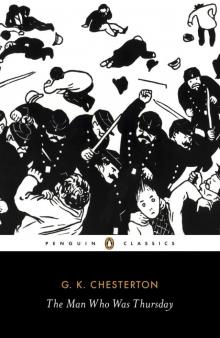 The Man Who Was Thursday: A Nightmare
The Man Who Was Thursday: A Nightmare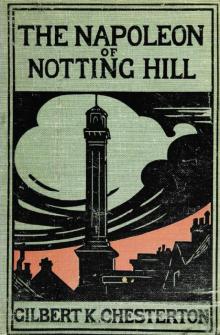 The Napoleon of Notting Hill
The Napoleon of Notting Hill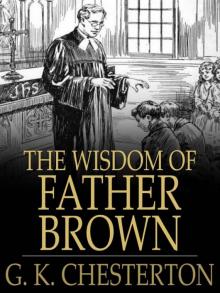 The Wisdom of Father Brown
The Wisdom of Father Brown G K Chesterton- The Dover Reader
G K Chesterton- The Dover Reader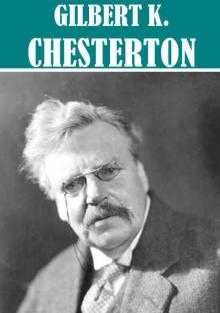 The Essential G. K. Chesterton
The Essential G. K. Chesterton The Trees of Pride
The Trees of Pride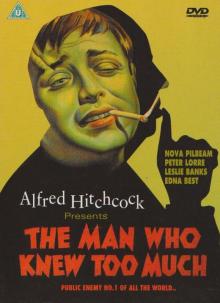 The Man Who Knew Too Much
The Man Who Knew Too Much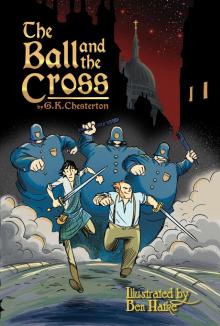 The Ball and the Cross
The Ball and the Cross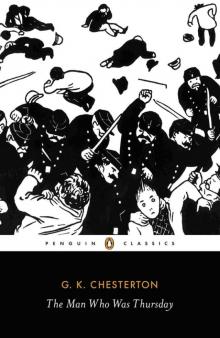 The Man Who Was Thursday (Penguin ed)
The Man Who Was Thursday (Penguin ed)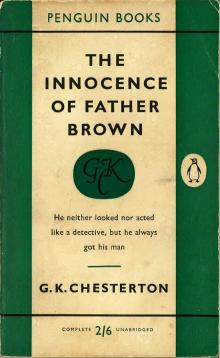 The Innocence of Father Brown
The Innocence of Father Brown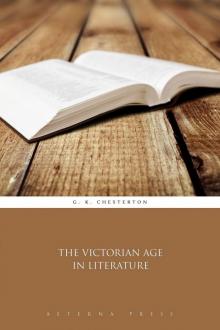 The Victorian Age in Literature
The Victorian Age in Literature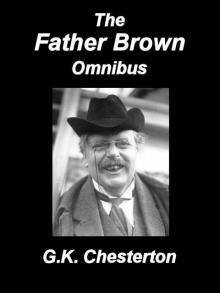 Father Brown Omnibus
Father Brown Omnibus Murder On Christmas Eve
Murder On Christmas Eve The Blue Cross
The Blue Cross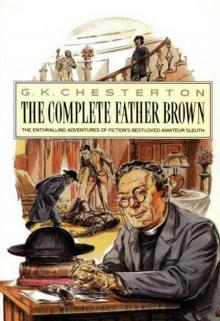 The Complete Father Brown Mysteries Collection
The Complete Father Brown Mysteries Collection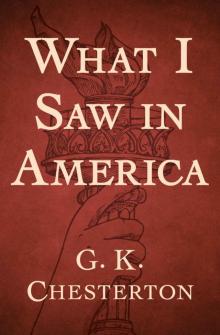 What I Saw in America
What I Saw in America